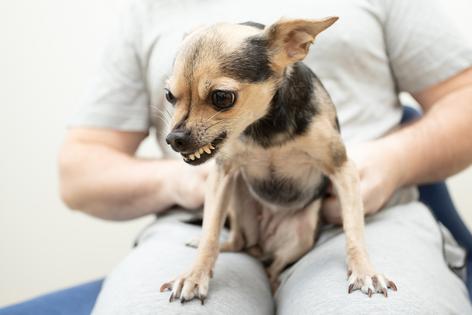My Pet World: My dog tries to bite me when I pick him up. Is that normal?
Dear Cathy,
I have a 15-year-old dog who’s generally in great shape for his age. People think he’s a puppy at the dog park. In the morning, he is affectionate and an aggressive cuddler. At bedtime, because of his age, I lift him onto my bed, where he sleeps every night.
My problem is, he snaps when I lift him. The snapping has gotten increasingly aggressive, and now I worry he may bite me. Is this an age thing, a pain thing, or a leave-me-alone thing? He was just at the vet a month ago for an annual checkup, and nothing suggested this behavior.
— Evan, Long Island, New York
Dear Evan,
Behavior changes are generally a sign of illness or pain, which at his age may be arthritis. I know he runs around at the dog park, but at 15, he may have joints that ache when touched in a certain way. Snapping is sometimes the only way a dog can let you know it hurts to be lifted.
Rather than lift him onto the bed when you might be at a weird angle to grab him, provide an ottoman or doggie stairs appropriate for his height so he can climb onto the bed himself. Put a nightlight near them so he can see them and leave a few treats on each level to encourage him to climb up on his own. You also could try a ramp, but most dogs are not exposed to ramps and, as such, aren’t likely to use them unless trained to do so.
Combine this with over-the-counter canine supplements. For joint care, look for products with glucosamine, chondroitin sulfate, omega fatty acids, vitamin E, selenium, and MSM, all available at local pet stores or online. To relax him, there are over-the-counter calming chews with L-Theanine and melatonin that you can give before bedtime. This should help him if it is a mild behavioral issue.
If these supplements don’t reduce his snapping when lifted, please take him to the vet again so he or she can determine if your dog needs prescription medications or if something else is going on.
Dear Cathy,
Our two, two-year-old, cats are litter mates. Over the past couple months, Rebecca has gotten aggressive, jumping at Marcy (who has a calmer personality) in ways that are fiercer than play-fights. This looks like repeated attempts to establish dominance. If Marcy curls up in my lap or my husband's lap, Rebecca will attack her for sure.
They get along most of the time, but no longer curl up together or groom each other. On occasion, Marcy will initiate a game of chase, but she is starting to slink around and hide from Rebecca.
They are regularly left alone in the house for some hours, and we don't let them in our room at night. They don't go outside and are not as interested in toys like when they were kittens, so sometimes they seem bored. We try to maintain balance by petting and praising both equally. What else can we do to keep Marcy from getting beat up?
— Jenna, Roanoke Virginia
Dear Marcy,
Litter mates don’t always get along as much as we think they would. They establish a very early hierarchy that stays with them throughout their lives. If one cat is always more dominant, the other cat never gets a chance to come out of her shell, so to speak.
Here are a few things to try: First, get feline pheromone plug-ins for your home and pheromone collars for both cats – or at least for Rebecca if that’s all you can afford. Feline pheromones will remind them of when they were kittens and can help restore some balance and reduce skirmishes. Spray feline pheromones where they sleep, on your laps, and on the couches, etc. to create even more calm.
Second, make sure Rebecca is not seeing a stray cat or other animal outside that she can’t get to. Cats can have misplaced aggression, which occurs when they see another animal they can’t get to and they take out their frustration on the closest person or animals inside.
Finally, get a “Pet Corrector” – a small can of compressed air that provides a “Shhh” sound to interrupt unwanted behaviors. Direct this towards Rebecca whenever she goes after Marcy. Marcy may also startle, but hopefully you only have to use it a few times to convince Rebecca to back off.
Finally, play with them separately several times for five to 10 minutes at a time. Tired cats are more likely to sleep than fight.
_____
_____
========
(Cathy M. Rosenthal is a longtime animal advocate, author, columnist and pet expert who has more than 25 years in the animal welfare field. Send your pet questions, stories and tips to cathy@petpundit.com. Please include your name, city, and state. You can follow her @cathymrosenthal.)
©2024 Tribune Content Agency, LLC.
(c) 2024 DISTRIBUTED BY TRIBUNE MEDIA SERVICES, INC.










